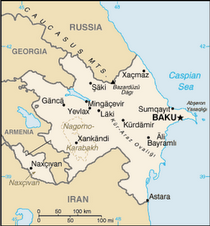
Every year during 30 days Muslim people fast during the month of Ramadan. Each year the month of Ramadan is moving backwards. Fasting people wake up early in the morning until the Sun comes out and eat (this is called imsaq) and fast the whole day until its dark. When Moon comes out people break their fast (this is called
iftar as mentioned in my yesterday’s post). When fast is open fasting people drink a bit of water, taste salt and eat dates first…In addition to fasting, fasting people can not/do not/should not drink, smoke, make love, gossip or behave badly during the month of Ramadan. Sorry for this dilettante way of Ramadan description. Thorough information can be found on sophisticated websites.
12 October, has been the end of Ramadan this year and public holidays continue in Azerbaijan until tomorrow. The tradition is that on Ramadan people go and visit as many fasting people they know as possible and congratulate them with the holiday. Fasting people receive presents and sweets and lots of attention. Many meals are prepared for dinner and guests come and go the whole day. The atmosphere is very festive. Women do a lot of cooking and get tired of course...Also one of the main and serious traditions is “fitra” – allocation of some sum of money which has to be equal number of members of the family multiplied by a certain sum of money per head (it can be also much more money of course than the formula gives :) depending on income and generosity of the family) and give it to poor so that they can prepare holiday dinner.
On holiday I visited my parents who fasted to congratulate them with their holiday and have dinner with them and pass small presents that we have prepared to them with my husband. We have already given out our “fitra”. This is a picture of "plov", so called "king of dishes" in Azerbaijan and its kind of dressings that my mom prepared. I will have separate post on plov one day.
Personally I have never fasted…initially I never thought about it, then I always had an excuse not to fast cause I thought that fasting and studying and working in parallel would be too hard. Ramadan is a psychologically hard month for non fasting people because they feel remorse each time they eat and drink while people around are fasting. There are many people around me who choose/are able to fast and I deeply respect their belief, discipline and strength of will. Therefore these days are their days. I can imagine the euphoria and pride they must feel for their belief, accomplishment, strength of will and discipline. Well done! Congratulations and respect!!
 In every house in Sheki there is a lamp like the one on this picture. This is an oil lamp that is used if the lights go off. Our grandmothers left them to us. During our wedding ceremonies there is always someone that walks in front of the/next to the bride and carries a lamp or candles as the symbol of light that bride would bring to her new family and home…
In every house in Sheki there is a lamp like the one on this picture. This is an oil lamp that is used if the lights go off. Our grandmothers left them to us. During our wedding ceremonies there is always someone that walks in front of the/next to the bride and carries a lamp or candles as the symbol of light that bride would bring to her new family and home….JPG)














